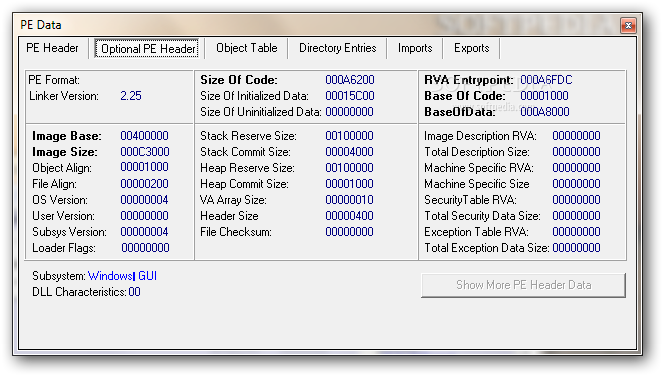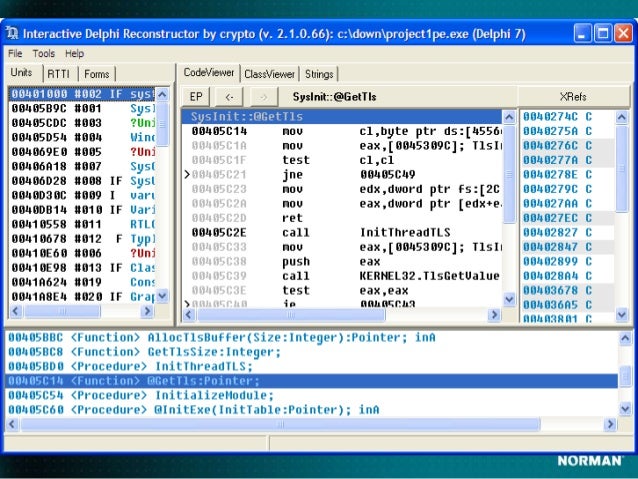- Quote of Author: Analyze executables compiled with Delphi Builder, Kylix and Kol Written by Alexandru Pintilie on June 27th, 2012 Decompiling executable files, no matter the programming language they have been compiled in, is a tedious job. DeDe (Delphi Decompiler) brags on performing this particular task fast and neat.
- The program firstly is intended for the companies, engaged by development of anti-virus software. It can also help programmers to recover lost source code of programs appreciably. The current version of the program can process files (GUI and console applications), compiled by Delphi compilers of versions Delphi2 – Delphi2009.
I came across this on delphi.about.com web site and thought it useful to add it a a reference here.
Decompilation? Reverse? Cracking?`
Decompiling DElphi DLL to Source Code. I would like to decompile the DLL to its complete Source Code. The DLL is a Delphi DLL and is very old one. I tried using Reflector it dint work. Tried PE Explorer dint work even. PLease suggest a solution for this its very Urgent. I am attaching this DLL, May be you can send the source.
Simply speaking, decompilation is the inverse of compilation: translating an executable file into a higher level language. Suppose you lose your Delphi project's source and you only have the executable file: reverse engineering (decompilation) is useful if the original sources are not available. Hm, 'sources not available', does this mean that we can decompile other people's Delphi projects? Well, yes and no..
Is true decompilation possible?No, of course not. Fully automated decompilation is not possible - no decompiler could exactly reproduce the original source code. When a Delphi project is compiled and linked to produce a standalone executable file, most of the names used in the program are converted to addresses. This loss of names means that a decompiler would have to create unique names for all the constants, variables, functions, and procedures. Even if a certain degree of success is achieved, the generated 'source code' lacks meaningful variable and function names. Obviously, source language syntax no longer exists in the executable. It would be very difficult for a decompiler to interpret the series of machine language instructions (ASM) that exist in an executable file and decide what the original source instruction was.
 Why and when to use.
Why and when to use.
Decompile Delphi Program
Reverse engineering can be used for a several reasons, some of which are: . Recovery of lost source code . Migration of applications to a new hardware platform . Determination of the existence of viruses or malicious code in the program . Error correction when the owner of the application is not available to make the correction. . Recovery of someone else's source code (to determine an algorithm for example).
Is this legal?
Reverse engineering is NOT cracking, although it is sometimes difficult to draw the fine line between those two. Computer programs are protected by copyright and trademark laws. Different countries have different exceptions to the copyright owner's rights. The most common ones state that it is ok to decompile: for the purposes of interpretability where the interface specification has not been made available, for the purposes of error correction where the owner of the copyright is not available to make the correction, to determine parts of the program that are not protected by copyright. Of course you should be very carefull / contact your lawyer if you are in doubt whether you are permitted to disassemble some program's exe file. Note: if you are looking for Delphi cracks, key generators or just serial numbers: you are on the wrong site. Please bear in mind that everything you find here is written/presented for exploration / educational purposes only.
Goto part twoGoto part three
I came across this on delphi.about.com web site and thought it useful to add it a a reference here.
Decompilation? Reverse? Cracking?`

Simply speaking, decompilation is the inverse of compilation: translating an executable file into a higher level language. Suppose you lose your Delphi project's source and you only have the executable file: reverse engineering (decompilation) is useful if the original sources are not available. Hm, 'sources not available', does this mean that we can decompile other people's Delphi projects? Well, yes and no..
Is true decompilation possible?No, of course not. Fully automated decompilation is not possible - no decompiler could exactly reproduce the original source code. When a Delphi project is compiled and linked to produce a standalone executable file, most of the names used in the program are converted to addresses. This loss of names means that a decompiler would have to create unique names for all the constants, variables, functions, and procedures. Even if a certain degree of success is achieved, the generated 'source code' lacks meaningful variable and function names. Obviously, source language syntax no longer exists in the executable. It would be very difficult for a decompiler to interpret the series of machine language instructions (ASM) that exist in an executable file and decide what the original source instruction was.
Decompiler Programme Delphi
Why and when to use.Reverse engineering can be used for a several reasons, some of which are: . Recovery of lost source code . Migration of applications to a new hardware platform . Determination of the existence of viruses or malicious code in the program . Error correction when the owner of the application is not available to make the correction. . Recovery of someone else's source code (to determine an algorithm for example).
Decompiling Delphi Program Download
Is this legal?Reverse engineering is NOT cracking, although it is sometimes difficult to draw the fine line between those two. Computer programs are protected by copyright and trademark laws. Different countries have different exceptions to the copyright owner's rights. The most common ones state that it is ok to decompile: for the purposes of interpretability where the interface specification has not been made available, for the purposes of error correction where the owner of the copyright is not available to make the correction, to determine parts of the program that are not protected by copyright. Of course you should be very carefull / contact your lawyer if you are in doubt whether you are permitted to disassemble some program's exe file. Note: if you are looking for Delphi cracks, key generators or just serial numbers: you are on the wrong site. Please bear in mind that everything you find here is written/presented for exploration / educational purposes only.

Goto part twoGoto part three